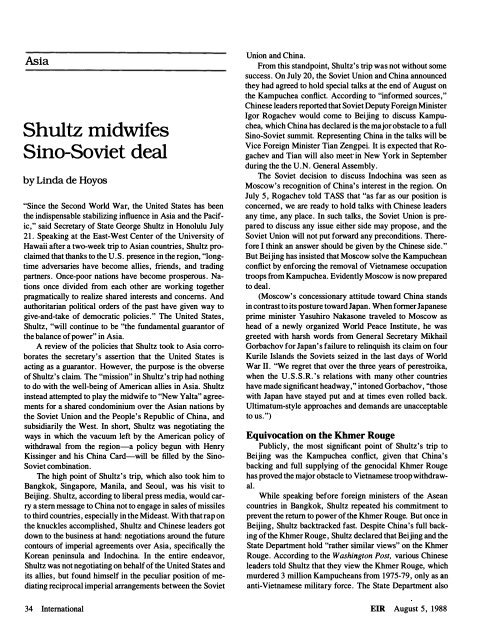View Full Issue - Executive Intelligence Review
View Full Issue - Executive Intelligence Review
View Full Issue - Executive Intelligence Review
Create successful ePaper yourself
Turn your PDF publications into a flip-book with our unique Google optimized e-Paper software.
Asia<br />
Shultz midwifes<br />
Sino-Soviet deal<br />
by Linda de Hoyos<br />
"Since the Second World War, the United States has been<br />
the indispensable stabilizing influence in Asia and the Pacific,"<br />
said Secretary of State George Shultz in Honolulu July<br />
21. Speaking at the East-West Center of the University of<br />
Hawaii after a two-week trip to Asian countries, Shultz proclaimed<br />
that thanks to the U.S. presence in the region, "longtime<br />
adversaries have become allies, friends, and trading<br />
partners . Once-poor nations have become prosperous. Nations<br />
once divided from each other are working together<br />
pragmatically to realize shared interests and concerns. And<br />
authoritarian political orders of the past have given way to<br />
give-and-take of democratic policies." The United States,<br />
Shultz, "will continue to be "the fundamental guarantor of<br />
the balance of power" in Asia.<br />
A review of the policies that Shultz took to Asia corroborates<br />
the secretary's assertion that the United States is<br />
acting as a guarantor. However, the purpose is the obverse<br />
of Shultz's claim. The "mission" in Shultz's trip had nothing<br />
to do with the well-being of American allies in Asia. Shultz<br />
instead attempted to play the midwife to "New Yalta" agreements<br />
for a shared condominium over the Asian nations by<br />
the Soviet Union and the People's Republic of China, and<br />
subsidiarily the West. In short, Shultz was negotiating the<br />
ways in which the vacuum left by the American policy of<br />
withdrawal from the region-a policy begun with Henry<br />
Kissinger and his China Card-will be filled by the Sino<br />
Soviet combination.<br />
The high point of Shultz's trip, which also took him to<br />
Bangkok, Singapore, Manila, and Seoul, was his visit to<br />
Beijing. Shultz, according to liberal press media, would carry<br />
a stem message to China not to engage in sales of missiles<br />
to third countries, especially in the Mideast. With that rap on<br />
the knuckles accomplished, Shultz and Chinese leaders got<br />
down to the business at hand: negotiations around the future<br />
contours of imperial agreements over Asia, specifically the<br />
Korean peninsula and Indochina. In the entire endeavor,<br />
Shultz was not negotiating on behalf of the United States and<br />
its allies, but found himself in the peculiar position of mediating<br />
reciprocal imperial arrangements between the Soviet<br />
34 International<br />
Union and China.<br />
From this standpoint, Shultz's trip was not without some<br />
success. On July 20, the Soviet Union and China announced<br />
they had agreed to hold special talks at the end of August on<br />
the Kampuchea conflict. According to "informed sources,"<br />
Chinese leaders reported that Soviet Deputy Foreign Minister<br />
Igor Rogachev would come to Beijing to discuss Kampuchea,<br />
which China has declared is the major obstacle to a full<br />
Sino-Soviet summit. Representing China in the talks will be<br />
Vice Foreign Minister Tian Zengpei. It is expected that Rogachev<br />
and Tian will also meet in New York in September<br />
during the the U.N. General Assembly.<br />
The Soviet decision to discuss Indochina was seen as<br />
Moscow's recognition of China's interest in the region. On<br />
July 5, Rogachev told TASS that "as far as our position is<br />
concerned, we are ready to hold talks with Chinese leaders<br />
any time, any place. In such talks, the Soviet Union is prepared<br />
to discuss any issue either side may propose, and the<br />
Soviet Union will not put forward any preconditions. Therefore<br />
I think an answer should be given by the Chinese side."<br />
But Beijing has insisted that Moscow solve the Kampuchean<br />
conflict by enforcing the removal of Vietnamese occupation<br />
troops from Kampuchea. Evidently Moscow is now prepared<br />
to deal.<br />
(Moscow's concessionary attitude toward China stands<br />
in contrast to its posture toward Japan. When former Japanese<br />
prime minister Yasuhiro Nakasone traveled to Moscow as<br />
head of a newly organized World Peace Institute, he was<br />
greeted with harsh words from General Secretary Mikhail<br />
Gorbachov for Japan's failure to relinquish its claim on four<br />
Kurile Islands the Soviets seized in the last days of World<br />
War II. "We regret that over the three years of perestroika,<br />
when the U.S.S.R.'s relations with many other countries<br />
have made significant headway," intoned Gorbachov, ''those<br />
with Japan have stayed put and at times even rolled back.<br />
Ultimatum-style approaches and demands are unacceptable<br />
to us.")<br />
Equivocation on the Khmer Rouge<br />
Publicly, the most significant point of Shultz's trip to<br />
Beijing was the Kampuchea conflict, given that China's<br />
backing and full supplying of the genocidal Khmer Rouge<br />
has proved the major obstacle to Vietnamese troop withdrawal.<br />
While speaking before foreign ministers of the Asean<br />
countries in Bangkok, Shultz repeated his commitment to<br />
prevent the return to power of the Khmer Rouge. But once in<br />
Beijing, Shultz backtracked fast. Despite China's full backing<br />
of the Khmer Rouge, Shultz declared that Beijing and the<br />
State Department hold "rather similar views" on the Khmer<br />
Rouge. According to the Washington Post, various Chinese<br />
leaders told Shultz that they view the Khmer Rouge, which<br />
murdered 3 million Kampucheans from 1975-79, only as an<br />
anti-Vietnamese military force. The State Department also<br />
EIR August 5, 1988

















